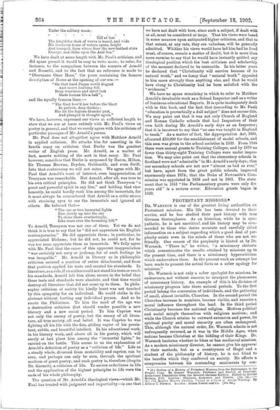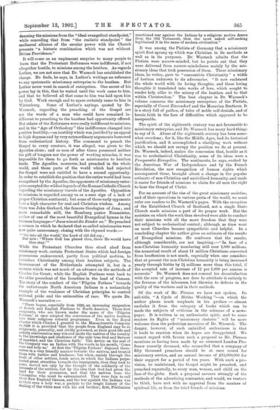PROTESTANT MISSIONS.*
DR. WA.RNECK is one of the greatest living authorities on Protestant missions. His life has been devoted to their service, and he has studied their past history with true German thoroughness. As an historian, while he is sym- pathetic, he is not uncritical, and his history may be com- mended to those who desire accurate and carefully sifted information on a subject regarding which a good deal of per- plexity exists even in the minds of those who are not un- friendly. One reason of the perplexity is hinted at by Dr. Warneck. "There is," he writes, "a missionary rhetoric which overestimates the results attained by missions up to the present time, and there is a missionary hypercriticism which undervalues them. In the present work an attempt has been made to present the actual facts as a sober apology for missions."
Dr. Warneck is not only a sober apologist for missions, he endeavours, not without success, to interpret the phenomena of missionary history. An example of this is his division of missionary progress into three natural periods. To the first period belong the conversion of individuals, and the gathering of small, almost invisible, Churches. In the second period the Churches increase in numbers, become visible, and exercise a moral influence throughout the land. In the third period Christianity becomes the national religion. Motives political and social mingle themselves with religious motives ; and while the Church attains to outward extension and power, its spiritual purity and moral sincerity are often endangered. This, although the natural order, Dr. Warneck admits is not unfrequently reversed, as it was in the Middle Ages, when nations became Christian at the bidding of their Sings. Dr. Warneck hesitates whether to bless or ban mediaeval missions. As a modern missionary director, he cannot give his approval to their methods, but as a countryman of Hegel and a student of the philosophy of history, he is not blind to the benefits which they conferred on society. He effects a compromise between his contending sentiments by con- • (L) NUM. of a History of Protsstant Missions from the Reformation to the Present Tim.. By Gustav Warnock, Professor and Doctor of Theology. Authorised Translation from the Seventh German Edition. Edited by George Robson, D.D. London : Oliphant, Anderson, and Ferrier. [10s. 6d.J- (2.) The Modern Mission Century, Viewed as a Cycle of Dieing -Working. BY Arthur T. Pierson. Loudon : James Nisbet and Co. [10a ed.)
damning the missions from the "ideal evangelical standpoint," while conceding that from "the realistic standpoint" the mediaeval alliance of the secular power with the Church presents "a historic combination which was not without Divine Providence."
It will come as an unpleasant surprise to many people to learn that the Protestant Reformers were indifferent, if not altogether hostile, to missions among the heathen. As regards Luther, we are not sure that Dr. Warneck has established the charge. He finds, he says, in Luther's writings no reference to any systematic missionary enterprise to the heathen. But Luther never went in search of enterprises. One secret of his power lay in this, that he waited until the work came to him, and that he believed all that came to him was laid upon him by God. Work enough and to spare certainly came to him in Wittenberg. Some of Luther's sayings, quoted by Dr. Warneck, regarding the preaching of the Gospel are not the words of a man who could have remained in- different to preaching to the heathen had opportunity offered. But others of the Reformers were really indifferent to missions, and in the "Age of Orthodoxy" this indifference changed into positive hostility,—an hostility which was justified by an appeal to high dogmas and by very extraordinary arguments borrowed from ecclesiastical history. The command to preach the Gospel to every creature, it was alleged, was given to the Apostles alone ; and as men of after times possessed neither the gift of tongues nor the power of working miracles, it was impossible for them to go forth as missionaries to heathen lands. The Apostles, moreover, had preached in the whole world, and those parts of the world which had rejected
the Gospel were not entitled to have a second opportunity. In order to establish the position that the entire world had been evangelised by the Apostles, the opponents of missionary enter- prise accepted the wiMestlegends of the Roman Catholic Church regarding the missionary travels of the Apostles. Opposition to missions is regarded among us as a sure sign of a lack of
proper Christian sentiment; but some of those early opponents bore a high character for zeal and Christian wisdom. Among them was John Gerhard, the famous theologian of Jena ; and more remarkable still, the Hamburg pastor Neumeister, author of one of the most beautiful Evangelical hymns in the German language—" Jesus nimmt die Sander an." He preached a sermon in which he declared that so-called missionaries were now quite unnecessary, closing with the rhymed words :— "Go into all the world,' the Lora of old did say ; But now: Where God has placed thee, there He would have thee stay.' " While the Protestant Churches thus stood aloof from missionary work, certain Protestant States which had foreign possessions endeavoured, partly from political motives, to introduce Christianity among their heathen subjects. The Government of the Netherlands attempted it, but in a manner which was not much of an advance on the methods of Charles the Great; while the English Puritans went back to the older precedent of the Israelites in the land of Canaan.
The story of the conduct of the "Pilgrim Fathers" towards the unfortunate North American Indians is a melancholy example of the weakness of Christian principles to control national pride and the animosities of race. We quote Dr. Warneck's narrative :—
"There began, especially from 1620, an increasing emigration of Scotch and English Puritans to North America. These first emigrants, who are known under the name of the Pilgrim Fathers,' at once adopted the conversion of the native heathen into their religious colonial programme. Even in the Royal charter which Charles I. granted to the Massachusetts Company in 1628 it is provided 'that the people from England may be so religiously, peaceably, and civilly governed, as their good life and orderly conversation may win and incite the natives of the country to the knowledge and obedience of the only true God and Saviour of mankind, and the Christian faith.' The device on the seal of the Company was an Indian with the words in his month, 'Come over and help us.' At first the 'Pilgrim Fathers' disposed them- selves in a very friendly manner towards the natives, and treated them with justice and kindness ; but when, mainly through the fault of other settlers, feuds arose, in which the Indians perpe- trated great atrocities towards the immigrants, then they took to arms, moved not only by the thought of the solidarity of the interests of the settlers, but by the idea that God had given the land for their possession, and that the natives were the Canaanites who must be exterminated. They were fain to call their New England Canaan, and the war against the Indians was in their eyes a holy war, a prelude to the tragic history of the dealing of the white man with his red brother; first, Puritanism
sanctioned war against the Indians by a religious motive drawn from the Old Testament, then the most naked self-seeking legitimised it in the name of modern civilisation."
It was among the Pietists of Germany that a missionary spirit first sprang up which was Christian in its methods as well as in its purposes. Dr: Warneck admits that the Pietists were narrow-minded, but he points out that they were delivered from narrow-mindedness mainly by the mis- sionary ideas that took possession of them. These missionary ideas, he writes, gave to "conventicle Christianity" a width of horizon unknown to its adversaries. "It now embraced the whole world with its loving thoughts, and these loving thoughts it translated into works of love, which sought to render help alike to the misery of the heathen and to that within Christendom." The best chapter in Dr. Warneck's volume concerns the missionary enterprises of the Pietists, especially of Count Zinzendorf and the Moravian Brethren. It is a story full of pathos, of tales of noble self-denials, and of heroic faith in the face of difficulties which appeared to be insuperable.
The spirit of the eighteenth century was not favourable to missionary enterprise, and Dr. Warneck has many hard things to say of it. Abuse of the eighteenth century has been some- what overdone ; for it, like the Middle Ages, had its historical justification, and it accomplished a clarifying work without which we should not occupy the position we do at present. Dr. Warneck, indeed, makes the concession that, hostile as it was to ecclesiastical Christianity, some of its ideas were a Praeparatio Evangeliea. The sentiments, he says, evoked by the American War of Independence and by the French Revolution, the new recognition of human rights which accompanied these, brought about a change in the popular estimate of non-Christian and uncivilised humanity, and made it easier for friends of missions to claim for all men the right to hear the Gospel of Christ.
For an account of the rise of the great missionary societies, and of their operations in various parts of the world, we must refer our readers to Dr. Warneck's pages. With the exception of the Established Church of Scotland, not a single State Church made missions a part of its proper work. But the societies on which the work thus devolved were able to conduct their missions with all the more freedom that they were not subject to ecclesiastical control ; although as time went on most Churches became sympathetic and helpful. In a concluding chapter the author gives an estimate of the results of Evangelical missions. He confesses that the results, although considerable, are not inspiring:—" In face of a non-Christian humanity numbering still over 1,080 millions, the numerical result of about 11 million Christians converted from heathenism is not much, especially when one considers that at present the non-Christian humanity is being increased yearly through births by 14 millions more than this total, if the accepted rate of increase of 12 per 1,000 per annum is accurate." Dr. Warneck does not conceal his dissatisfaction with the rate of progress, nor does he attribute it entirely to the fewness of the labourers, but likewise to defects in the quality of the workers and in their methods.
Of the work of Mr. Pierson we have not spoken. Its sub-title, "A Cycle of Divine Working "—on which the author places much emphasis in his preface — almost excludes it from the category of books which can be made the subjects of criticism in the columns of a news- paper. It is written in an enthusiastic spirit, and to some readers its flights of "missionary rhetoric" will be more welcome than the pedestrian narrative of Dr. Warneck. The danger, however, of such unbridled enthusiasm is that it leads to reaction when its hopes are disappointed. We cannot regard with favour such a proposal as Mr. Pierson mentions as having been made by an esteemed London Pro- fessor recently deceased, who counselled that a company of fifty thousand preachers should be at once raised for missionary service, and an annual income of £15,000,000 for their support for a period of ten years. With such a pro- vision, he maintained, the Gospel might be preached, and preached repeatedly, to every man, woman, and child on the face of the globe. Such a proposal savours strongly of the methods of the advertising contractor, and would, we venture to think, have met with no approval from the masters of spiritual life, or from the tried friends of missions.







































 Previous page
Previous page